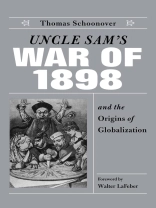The roots of American globalization can be found in the War of 1898. Then, as today, the United States actively engaged in globalizing its economic order, itspolitical institutions, and its values. Thomas Schoonover argues that this drive to expand political and cultural reach—the quest for wealth, missionary fulfillment, security, power, and prestige—was inherited by the United States from Europe, especially Spain and Great Britain. Uncle Sam’s War of 1898 and the Origins of Globalization is a pathbreaking work of history that examines U.S. growth from its early nationhood to its first major military conflict on the world stage, also known as the Spanish-American War. As the new nation’s military, industrial, and economic strength developed, the United States created policies designed to protect itself from challenges beyond its borders. According to Schoonover, a surge in U.S. activity in the Gulf-Caribbean and in Central America in the late nineteenth and early twentieth centuries was catalyzed by the same avarice and competitiveness that motivated the European adventurers to seek a route to Asia centuries earlier. Addressing the basic chronology and themes of the first century of the nation’s expansion, Schoonover locates the origins of the U.S. goal of globalization. U.S. involvement in the War of 1898 reflects many of the fundamental patterns in our national history—exploration and discovery, labor exploitation, violence, racism, class conflict, and concern for security—that many believe shaped America’s course in the twentieth and twenty-first century.
Über den Autor
Thomas D. Schoonover is professor emeritus of history at the University of Louisiana at Lafayette. He is the author of eight books, including Uncle Sam’s War of 1898 and the Origins of Globalization, The Banana Men, and Germany in Central America.












